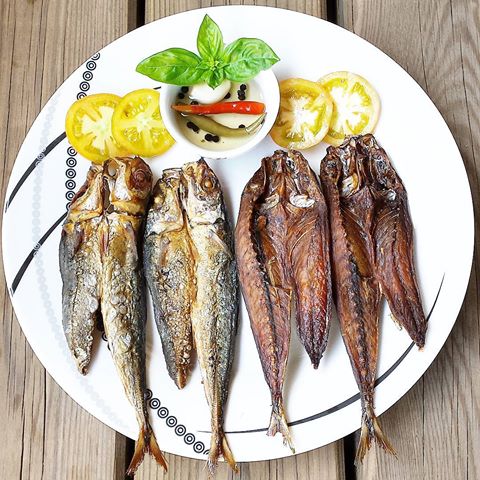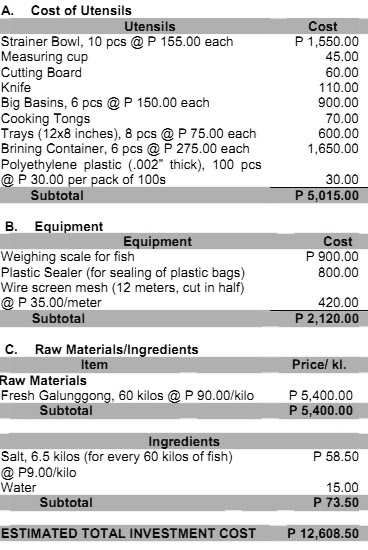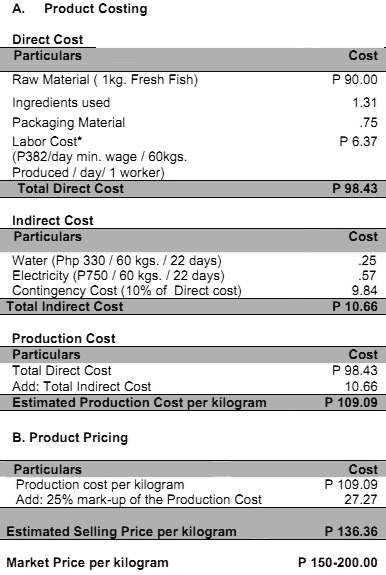Dried split fish, commonly known as “daing” (split form) is the fish that has been converted from the fresh state to a much lower moisture level with the use of heat with or without salt to maintain its acceptability over an extended period of time.

Starting a salted dried split fish business is a rewarding venture if you’re passionate about seafood and want to tap into a profitable and timeless market. With the right strategy, you can turn this small business idea into a thriving business. So, are you ready to dive in?
I. Estimated Investment Costs

*Based on 2009 prices
**Sources of prices:
– Paco, San Andres, and Sta Ana Wet Markets (for fresh fish and ingredients);
– Landmark, SM Department Store, Binondo shops/stores (for utensils and equipments)
II. Procedure
1. Wash the Galunggong thoroughly with clean and fresh water.
2. Split the fish into butterfly fillet and remove the gills and internal organs. Wash fish again thoroughly.
3. Place the fish in a strainer and drain.
4. Prepare the brine solution (i.e., mixture of water and salt). For a 60-kg. fresh fish, use 6.5 kls. of salt and 5 gallons of water.
5. Soak the fish in brine solution for one hour.
6. Drain the salted fish.
7. Rinse the fish thoroughly under running water to wash off excess salt.
8. Arrange or lay fish in wire screen mesh. Do not place the fish on top of each other so that fish will dry evenly.
9. Cover the fish with the other half of the screen mesh/wire screen to prevent contamination while drying.
10. Dry fish under the sun or direct sunlight for two to three days.
11. After drying, allow the dried fish to cool for at least 6 hours at room temperature.
12. Weigh, pack, seal, and store dried fish at room temperature.
• Assumptions:
– Salted fish drying is done for 22 days / month.
– 60-kg. fish produces 40 kg. of dried fish (daing).
• Sources on procedures:
– Sustainable Livelihood Options for the Philippines
– An Information Kit (Coastal Ecosystem).
Department of Environment and Natural Resources (DENR).
– Department of Science and Technology (DOST) – Industrial Technology Development Institute
III. Estimated Costing and Pricing (FOR 1 KILOGRAM OF GALUNGGONG DAING)

* The higher the volume of production per day (more than 60kgs.), the lower the production cost, thus further increasing the mark-up to more than 25%. The higher the mark-up, the higher the profit margin.
* If price per kilogram is lower compared with the existing market price, increase mark-up to 25% or more.
IV. Package Like a Pro
People eat with their eyes first—even when it’s dried split fish. Your packaging should:
Protect: Use vacuum-sealed or airtight bags to keep the product fresh.
Inform: Include clear labels with your brand name, weight, expiration date, and storage instructions.
Stand out: A little design flair goes a long way, especially for export markets.
V. Market Like You Mean It
Here’s where the fun begins.
Local hustle: Build relationships with wet markets, groceries, and even restaurants.
Go online: Platforms like Shopee, Lazada, TikTok shop or even Facebook Marketplace can help you reach more people.
Dream big: Filipino communities abroad love a taste of home. Partner with exporters or join trade fairs to tap into this market.
VI. Think Big (and a Little Different)
Once you’ve got the basics down, look for ways to grow.
Try flavored options like spicy daing, cheesy, barbeque or garlic-infused dried split daing.
Package gift sets—perfect for balikbayan boxes or holiday bundles.
Explore eco-friendly packaging if you want to appeal to green-minded customers.
VII. Business Registration Requirements
Food safety is critical. Register your business with local government units (LGUs) and relevant food safety authorities, like:
The Bureau of Fisheries and Aquatic Resources (BFAR) if exporting.
The Philippine FDA for processed food products.
1. Business Name Registration
Department of Trade and Industry (DTI) within NCR
a) 12/F, Trafalgar Plaza,
105 H.V. Dela Costa St., Salcedo Village, Makati City
Tel. No.: (632) 811.8232 loc 208
b) 2/F, Park N’ Ride, Lawton,
P. Burgos Ave., Dr. Basa St. Ermita, Manila
Tel. No.: (632) 536.7153
c) G/F, Highway 54 Plaza, EDSA, Mandaluyong City (across SM Megamall),
Tel: No.: (632) 706.1767
d) 5/F, Araneta Square Mall, Monumento Circle, Kalookan City
Tel. No.: (632) 332.0854 / 332.0829
DTI Office in the province where the business is located
Website: www.bnrs.dti.gov.ph for online registration
Validity: 5 years
2. Mayor’s Permit/ Residence Certificate and Sanitary Permit
Municipality or city where the business is located
Validity: 1 year
3. Tax Identification Number (TIN)
Bureau of Internal Revenue (BIR)
BIR National Office Bldg., Agham Road, Diliman, Quezon City
Trunkline: (632) 981.7000 / 981.8888
Email: contact_us@cctr.bir.gov.ph
www.bir.gov.ph
BIR Regional or District Office where the business is located
4. BFAD Certificate
Bureau of Food and Drugs (BFAD)
Civic Drive, Filinvest Corporate City, Alabang, Muntinlupa City
Tel. No.: (632) 807.0721 / 842.5606
Email: bfad@bfad.gov.ph
www.bfad.gov.ph
BFAD Office in the province where the business is located.
Validity: 1 year
Some Final Thoughts
Starting this business might sound intimidating, but here’s the secret: take it one step at a time. Focus on delivering quality, building trust, and staying consistent. It’s not just about making salted dried split fish—it’s about creating something people will crave over and over again.
So, what’s stopping you? The market’s waiting, and you’ve got this!

This is a wonderful article for everyone, Actually, I was found the same as well.
Cost of legal permit on dti?